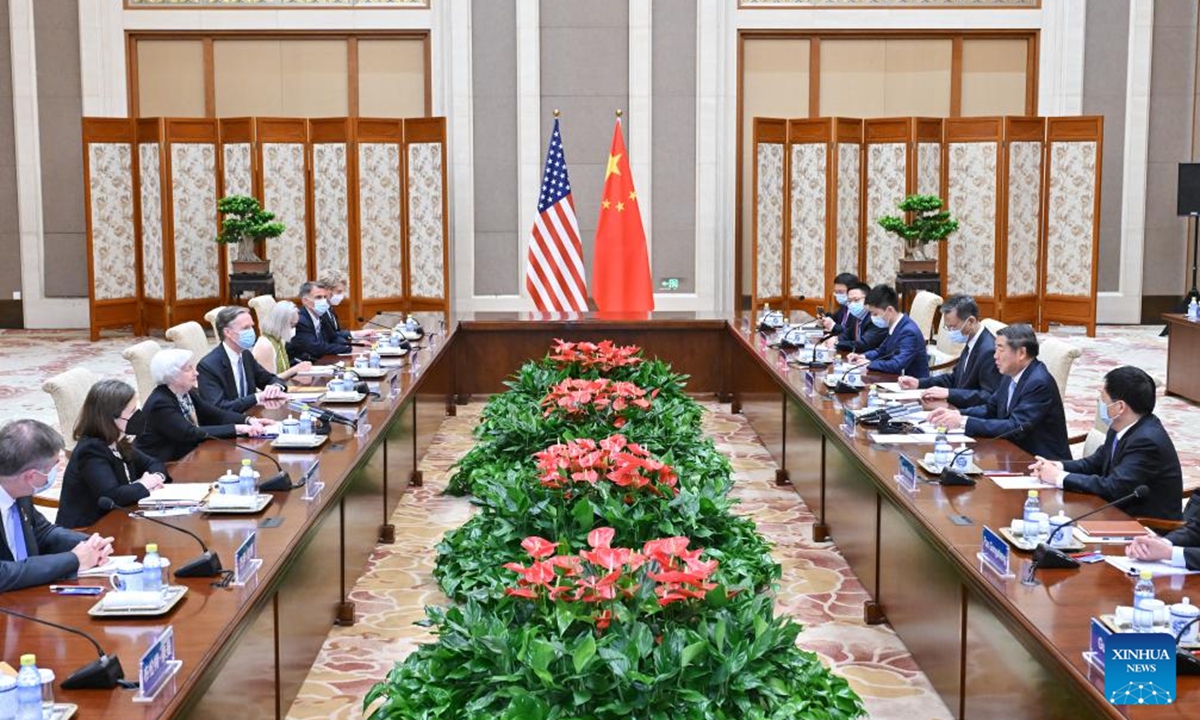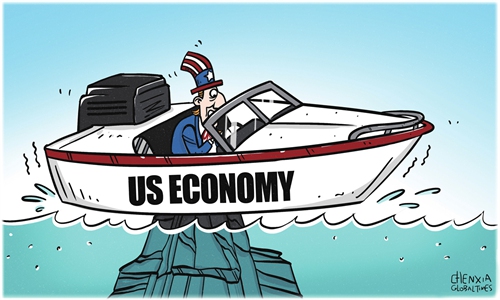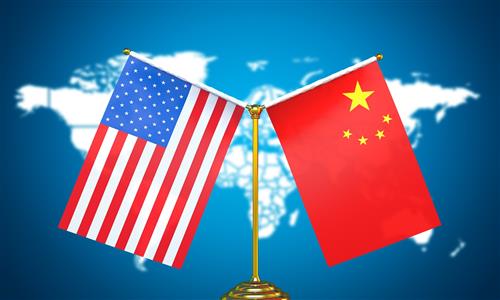China, US ramp up high-level contacts in finance
Ramped-up efforts in pragmatic engagement to stabilize ties, paving way for more exchanges

Chinese Vice Premier He Lifeng meets with U.S. Treasury Secretary Janet Yellen in Beijing, capital of China, July 8, 2023. (Xinhua/Yue Yuewei)
Following the first meeting of the Economic Working Group, China and the US held the first meeting of the Financial Working Group on Wednesday, a latest move by the world's two largest economies to deliver outcomes by increasing pragmatic engagement, observers said, setting the stage for more high-level exchanges in the coming months.
The two-hour virtual meeting includes a substantive and wide-ranging discussion on global financial stability, financial supervision and regulation, sustainable finance, and anti-money laundering and countering the financing of terrorism, according to the website of US Department of the Treasury.
The meeting was led by senior officials from the US Department of the Treasury and the People's Bank of China (PBC), with participation by other regulatory agencies.
The Financial Working Group meeting, which serves as an ongoing channel for both countries to discuss financial policies and cooperation on common challenges, came two days after the two countries held their first meeting of the Economic Working Group, during which the two sides had in-depth, frank and constructive communication over macroeconomic issues as well as bilateral economic ties.
The Chinese authorities have not released information regarding this meeting as of press time on Thursday.
He Weiwen, a senior fellow of the Center for China and Globalization, told the Global Times on Thursday that "the two meetings held in a row signified that China and the US have entered a pragmatic phase in dealing with specific issues, and the current moment is a good time, based on the atmosphere created by a streak of high-level official engagements since the start of the year."
California Governor Gavin Newsom is in China for a week-long trip that started on Monday. Newsom's trip follows recent visits to China by a number of Biden administration officials including Secretary of State Antony Blinken, Treasury Secretary Janet Yellen, Commerce Secretary Gina Raimondo and US Senate Majority Leader Chuck Schumer.
Wang Yi, a member of the Political Bureau of the Communist Party of China Central Committee and the foreign minister, is scheduled to visit the US from October 26 to 28 at the invitation of Blinken, the Chinese Foreign Ministry said on Tuesday.
Both the high-level engagement momentum and pragmatic implementation of previously reached consensus items are believed to be preparatory work, setting the stage for a possible meeting of the two heads of state at the upcoming APEC summit in San Francisco in November, according to He.
When asked whether the Chinese leader would attend the upcoming APEC meeting, Wang said in late September that as the world's largest developing country and an important member of APEC, China is willing to meet the expectations of the international community and play a constructive role in ensuring the success of this year's APEC meeting.
In September, China and the US agreed to set up two working groups for economic and financial matters in what observers said was a major step that put the brake on a downward spiral in bilateral ties.
The Economic Working Group is led by vice-ministerial officials from the Ministry of Finance of China and the US Treasury Department, while the Financial Working Group is led by vice-ministerial officials from the PBC and the US Treasury Department.
Apart from frequent high-level communications, business and trade circles from the two countries have also seen improving signs.
A delegation of Chinese enterprises on Monday signed 11 agriculture purchase contracts with US exporters worth billions of dollars, one of the few mass deals since the US initiated a trade war against China in 2018.
The positive actions taken by both China and the US in enhancing communications and strengthening economic ties have sent a stabilizing signal for a global economy that is struggling with a subdued recovery, experts said, although there won't be any drastic change in the US posture of strategic competition with China.
Taking the meeting of Financial Working Group as an example, He said it is basically about coordination of financial policies, not involving disputes in the high-tech sector, where the US is stepping up its assault on China.
Wu Xinbo, director of the Center for American Studies at Fudan University, told the Global Times that a significant breakthrough in US economic policy toward China cannot be expected, and China holds no illusions about that.
"In the high-tech sector, Washington's relentless attack on Chinese firms, citing the 'national security' cliché, is aimed at containing China's technology innovations and economic rise," Wu said, adding that Washington should not coerce China with its hysterical political agenda as the 2024 presidential election is drawing near.
The US released new rules earlier this month to further restrict China's access to advanced chips and chipmaking tools. The latest move aimed at curbing China's technological development is to close loopholes in existing export regulations announced last year.
In response, China's Ministry of Commerce blasted the tightened export restrictions on China, vowing to take necessary measures to maintain China's legitimate rights and interests.



